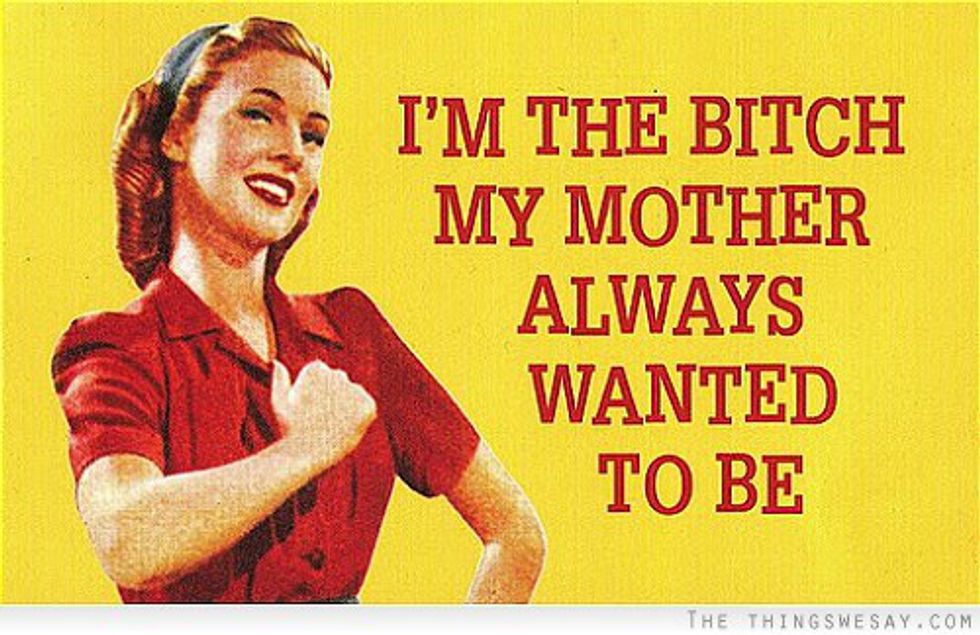“We must be strong, we must be militant, we must be dangerous. We must realize that Bitch is Beautiful and that we have nothing to lose. Nothing whatsoever.” (The BITCH Manifesto)
The word bitch is one of the most complicated insults in the English language. There are abundant ways in which this word can be used. Bitch’s original meaning is a female dog in heat, but now to be a ‘bitch’ is to be an irritating, malicious woman. There are some women who self-identify as ‘bitches’, signifying that they are strong and independent. When someone 'rides bitch,' they ride specifically in the middle of a front-seatting only car. The term ‘bitchin’’ is a describing word meaning that something is cool or enjoyable, but a person who is ‘bitching’ is complaining or whining. A ‘son of a bitch’ is a disgraceful, blameworthy man, but can also be used to describe a friend who has done something notable. A ‘bitch slap’ is to smack someone with an open hand, and to be ‘someone’s bitch’ is to be a slave to someone who doesn’t care much about him or her. The term bitch may have originally been referring to a female dog, but now it can signify anything from a heartfelt compliment to a hateful insult.
With so many different uses of the word running around, how are we supposed to know what “bitch” actually means? Is it a sexist slight, or is it empowering to women? Take a look at a few different dictionary entries on the word “bitch,”
bitch
/biCH/
noun
noun: bitch; plural noun: bitches; noun: a bitch
1. A female dog, wolf, fox, or otter.
2. A spiteful or unpleasant woman.
3. A difficult or unpleasant situation or thing.
4. A complaint.
5. verb: bitch; 3rd person present: bitches; past tense: bitched; past participle: bitched; gerund or present participle: bitching
- express displeasure; grumble. "they bitch about everything” (Dictionary.com)
- The Merriam-Webster Dictionary defines the word bitch as “a lewd or immoral woman,” “malicious, spiteful, or overbearing woman,” and “something that is extremely difficult, objectionable, or unpleasant.”(Merriam-Webster dictionary)
- The 1811 Dictionary in the Vulgar Tongue defines the word as “the most offensive appellation that can be given to an English woman, even more provoking than that of whore.”(1811 Dictionary in the Vulgar Tongue)
Interestingly enough, most all of the different uses of “bitch” mentioned earlier occur within reputable dictionaries. A common misconception is that the dictionary definition of a word more accurately represents the word’s meaning than an individual speakers understanding of the word. What the public tends to forget is that people who write dictionaries arrive at their definitions by studying the ways speakers of the language actually use the words in every day life. Entries in dictionaries are in no way fixed or permanent; they change over time, and from edition to edition, as people come to use words differently. Dictionaries model usage, not the other way around. This happens because of a process called language change. Language change is when features of a language are altered over periods of time. Language is constantly responding to the needs of those who use it, and will continue to develop and modify based on how we use it. So while some words like “bitch” were born out of a simple definition, over time they can completely change from their original meaning. The word “bitch,” just like most other words, is constantly being developed and shaped by how society currently uses it. “Bitch" originally started out as a descriptive term, developing later into an offensive slur, and is now on the cusp of becoming neutral, even empowering.
But what is it that gives words certain meanings, you ask? How can one simple word go from describing a dog in heat, to a strongly disliked woman, to a strong and independent woman? Through associated meaning, of course! Most often words can be divided into two different types of meaning: denotative and connotative. A denotative meaning describes precisely what something is, similar to a dictionary definition. Denotatively, a four-legged furry canine is a dog. Connotative meanings are the thoughts and feelings toward this dog based on their own personal experiences. The connotative meaning of a word is extremely personalized and entirely unique to each different person. Therefore, there is a great deal more to a word than just the definition. The connotative associations of words are integrated into the process of creating new meanings for words. This is one of the big reasons why there are so many definitions of the word “bitch.”
The most recent, and positive, definition of the word was born out of this exact process. While men and women alike used “bitch” to describe an assertive and overbearing woman, it suddenly became something that many women began to gain a sense of pride about. Instead of feeling ashamed of being a “bitch,” women began to take pride in the things that the word criticized them for. Being assertive and strong was something to strive for rather than conceal. Third-wave feminism of the 90’s aimed to reclaim derogatory words against women, one of them being “bitch.” In the name of “girl power,” these activists worked to flip “bitch” on its head and promote a more positive meaning of the word. By openly accepting and embracing the term “bitch,” third-wave feminists have certainly changed its path of meaning. They have transformed the connotation of “bitch” in order to criticize sexism, while effectively expanding women’s rights in the process.
While the original slanderous definition of bitch did not change completely, women of this era, and today still, strive to take away the power that "bitch" holds over the female gender. Denise Riley puts it best in her book "Impersonal Passion: Language as Affect," stating, “What sounded obscene to the ears of one generation […] becomes the norm for the next” (Riley, 98). So in today’s society, women can be proud to be bitches. The word “bitch” is rapidly losing its negative context, and although the harmful origins of the word remain intact, each new generation takes another step toward reclaiming and transforming it into a word of power.

























